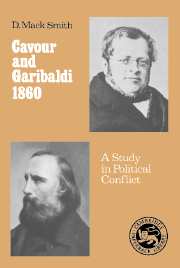Book contents
- Frontmatter
- Contents
- Preface
- Abbreviations
- Introduction
- Chapter I Political opinions in Sicily: April–June 1860
- Chapter II Cavour and the diplomats: April–June
- Chapter III La Farina and Crispi: June
- Chapter IV Arguments for and against annexation
- Chapter V Arguments over ways and means
- Chapter VI Crispi loses the first round: June
- Chapter VII Cavour loses the second round: July
- Chapter VIII Cavour adjusts his policy: July
- Chapter IX Depretis begins his prodictatorship: July
- Chapter X Cavour plans a revolt at Naples: July
- Chapter XI Cavour fails at Naples: August
- Chapter XII Political differences in Sicily: August
- Chapter XIII Cavour forces Depretis to a choice: 1–8 September
- Chapter XIV Depretis fails to persuade Garibaldi: 8–14 September
- Chapter XV Garibaldi succeeds at Naples: 1–15 September
- Chapter XVI Cavour breaks with Garibaldi: September
- Chapter XVII The radicals at bay: September
- Chapter XVIII Mordini the new prodictator: 17–25 September
- Chapter XIX Further controversy over annexation: September–October
- Chapter XX Mordini summons an assembly: 5 October
- Chapter XXI Pallavicino fights for a plebiscite: 8 October
- Chapter XXII Parliament supports Cavour: October
- Chapter XXIII Mordini changes his mind: 9–13 October
- Chapter XXIV Garibaldi makes his decision: 9–13 October
- Chapter XXV The plebiscite in Sicily: October
- Chapter XXVI The doubtful significance of the vote: October–November
- Chapter XXVII Cavour's government in the south: November–December
- Chapter XXVIII Conclusion
- Index
Chapter XXIV - Garibaldi makes his decision: 9–13 October
Published online by Cambridge University Press: 30 October 2009
- Frontmatter
- Contents
- Preface
- Abbreviations
- Introduction
- Chapter I Political opinions in Sicily: April–June 1860
- Chapter II Cavour and the diplomats: April–June
- Chapter III La Farina and Crispi: June
- Chapter IV Arguments for and against annexation
- Chapter V Arguments over ways and means
- Chapter VI Crispi loses the first round: June
- Chapter VII Cavour loses the second round: July
- Chapter VIII Cavour adjusts his policy: July
- Chapter IX Depretis begins his prodictatorship: July
- Chapter X Cavour plans a revolt at Naples: July
- Chapter XI Cavour fails at Naples: August
- Chapter XII Political differences in Sicily: August
- Chapter XIII Cavour forces Depretis to a choice: 1–8 September
- Chapter XIV Depretis fails to persuade Garibaldi: 8–14 September
- Chapter XV Garibaldi succeeds at Naples: 1–15 September
- Chapter XVI Cavour breaks with Garibaldi: September
- Chapter XVII The radicals at bay: September
- Chapter XVIII Mordini the new prodictator: 17–25 September
- Chapter XIX Further controversy over annexation: September–October
- Chapter XX Mordini summons an assembly: 5 October
- Chapter XXI Pallavicino fights for a plebiscite: 8 October
- Chapter XXII Parliament supports Cavour: October
- Chapter XXIII Mordini changes his mind: 9–13 October
- Chapter XXIV Garibaldi makes his decision: 9–13 October
- Chapter XXV The plebiscite in Sicily: October
- Chapter XXVI The doubtful significance of the vote: October–November
- Chapter XXVII Cavour's government in the south: November–December
- Chapter XXVIII Conclusion
- Index
Summary
Mordini had been forced into his desperate position by the swift change in Sicilian opinion, and by the failure of either Garibaldi or Crispi to send him instructions. He was unwilling for the second time to act altogether on his own at Palermo, especially as political developments in Sicily had become so much dependent upon events at Naples. But then the news of Pallavicino's decree had finally allowed him to think that Garibaldi at Naples could not really object if Sicily came into line by giving up her elected assembly: and on the strength of this he gave in.
His impression, however, was incorrect. Garibaldi's characteristic vacillation was never more in evidence than now. On the 6th Crispi had found the dictator favouring an assembly. But on the next day the news of Cavour's speech had arrived at Naples, and produced ‘très bon effet sur l'esprit de Garibaldi’. Pallavicino came away from him on the 7th with the conviction that he was now for a plebiscite, and on this basis the Neapolitan government had issued the decree which threw Mordini into such despair. The more conservative papers at Naples announced with much satisfaction that Pallavicino had triumphed over Crispi, the conservative ministry over the radical secretariat. ‘In the short space of twenty-four hours the position has been completely changed. We have stopped short on the brink of anarchy … The sectarians had just begun to spread among the people a discontent with the new order of things … and were providing food for the general sentiment of anxiety which prevails among the multitude’; but then the prodictator's intervention had saved the day.
- Type
- Chapter
- Information
- Cavour and Garibaldi 1860A Study in Political Conflict, pp. 356 - 375Publisher: Cambridge University PressPrint publication year: 1985



